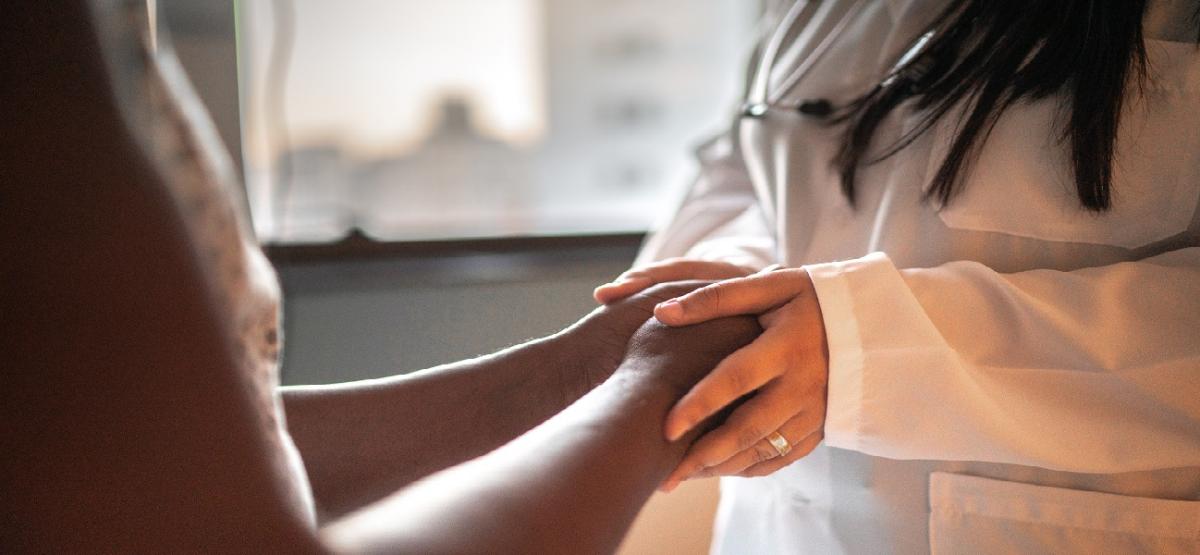Coping with a blood cancer diagnosis and the whirlwind of experiences that follows can be physically, mentally, and emotionally draining for everyone impacted by it.
Whether you're a patient or caregiver, you begin to realize your life will never be the same.
There seems to be a moment when time stops. Lots of emotions are stirred up. The mind numbs. It’s easy for fear to take over.
And if you or your loved one achieves remission, there’s still a resulting level of stress and maybe pressure to get back to “normal” quickly. Now you’re left to navigate through the world as someone who has had cancer.
We know it can feel isolating and may make you feel alone.
But you don’t need to be. And you’re not.

Bump up your mental health.
If you’ve spent any time in a business setting, “bumping” an email to the top of someone’s inbox is a nice reminder for them to prioritize it.
So that’s what we’re doing for you: Reminding you to prioritize your mental health.
What do we mean by mental health?
We mean your emotional and psychological well-being. It guides how you handle stress, manage relationships, and make decisions.
And what’s more, your mental health can directly affect how you feel physically. So, making your mental health more of a priority (especially after a blood cancer diagnosis) can make a big difference. And finding a few resources that can help is key.
Naturally, some of the more common emotional responses to a blood cancer diagnosis and subsequent treatment are fear, depression, and anxiety. Identifying the symptoms is the first step in treating them.
Studies show that people who are depressed and have a serious illness like cancer are more likely to experience more severe symptoms of both depression and their cancer. Researchers also have some evidence that treating depression can result in a better outcome (prognosis) for the disease.
Start here: Recognize signs.
Emotions like fear, sadness, guilt, anger, and/or stress are normal and healthy responses to difficult life events such as a cancer diagnosis. However, if these feelings persist over time, become difficult to manage, and impact your daily functioning, finding professional help and support can completely change how you cope and process everything to come.
The National Institute of Mental Health lists a variety of symptoms for depression—from fatigue to irritability to headaches, stomachaches or digestive problems—as not everyone experiences the same ones.
If you experience any of them most of the time for at least 2 weeks, we recommend talking with your doctor for help and guidance.
Explore some ways to help yourself.
1. Learn about blood cancer.
Knowledge is power, and LLS has lots of FREE ways to get the information you need:
- Join LLS Community, an online forum where patients and caregivers can connect with others in their situation and share helpful resources
- Listen to our podcast, The Bloodline, which regularly hosts medical experts, patients and survivors, and others in the blood cancer community
- Watch our series of webcasts covering various aspects of the social-emotional side of a cancer diagnosis
- Read a few informational booklets and materials, including some focused specifically on mental health or managing stress to get you started
2. Find opportunities to create more joy.
To care for your emotional health, find new outlets to explore and enjoy. Try things like:
*Note: if you are a patient, you should consult with your medical team before trying out anything that involves exercise and/or before trying any complementary therapies.
3. Say “no” when you need to.
It may be a small thing, but don’t be afraid to say no when you’ve hit your limit. You may not feel like you have the time, energy, or interest needed to participate, and that's OK.
4. Reach out.
Talk and connect with friends and family so they can understand what you’re feeling and where you are. Limited social support and isolation can amplify depression and anxiety. You may find real value in connecting with other blood cancer patients, survivors, and caregivers to share experiences. A few options:
- LLS Community, an online forum where patients and caregivers can connect with others in their situation and share experiences and helpful resources
- Live weekly Online Chats moderated by a social worker and organized by cancer type or role (e.g., caregiver, young adults) for ease
- Peer-to-peer volunteers through the Patti Robinson Kaufman First Connection® Program, who are matched to patients and caregivers who know what you’re going through
If needed, find professional support by reaching out to your healthcare team, social worker, mental health therapist, or psychiatrist. If symptoms are severe, such as a mental health crisis, consider calling 9-8-8.
5. Sleep and eat as well as you can.
It goes without saying that getting enough sleep is crucial to combat fatigue and depression. But we’re saying it anyway. Taking control over your sleeping habits and sleep hygiene routine improves energy, helps you cope with side effects of treatment, and aids with remembering treatment instructions and decision making. Habits and routines that may help improve sleep include:
- Making your bed and bedroom more comfortable with the right temperature, comfortable blankets, and silence or low light
- Staying active during the day and getting regular exercise
- Avoiding the TV or work in the bedroom
And eating the right foods can make a big difference in how you feel and recover. LLS registered dietitians offer free oncology nutrition consultations, in case you’re unsure what’s best for your body.
Most importantly, realize that there are people and resources available to help with your mental health. You can prioritize it by reaching out to get started.
Get One-on-One, Personalized Support. Our Information Specialists provide disease and treatment information, clinical-trial searches, and financial and social support.
